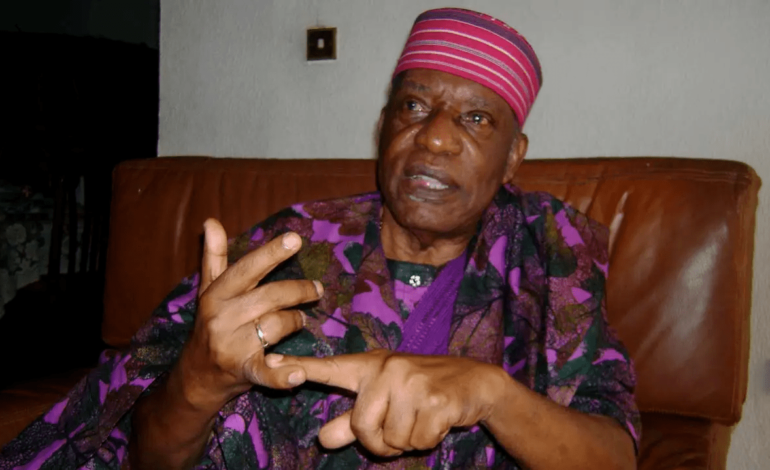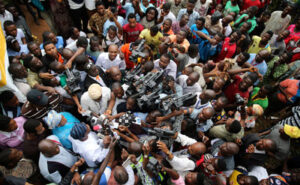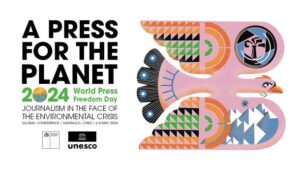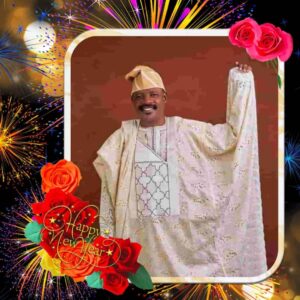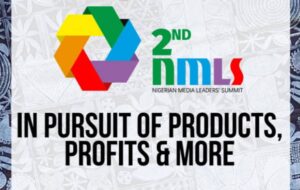Top journalists who worked with veteran journalist and former presidential spokesperson, Chief Duro Onabule who died at 83, on August 16, have paid glowing tributes to their former boss.
In their tributes to the former Editor of National Concord and Chief Press Secretary to former President Ibrahim Babangida, they shared various insightful lessons they learnt from Onabule who was a columnist with Sun Newspaper that helped their careers.
Onabule who was born in 1939 in Ijebu-Ode attended CMS Grammar School and the School of Journalism, London. His first media work was as a reporter for the Daily Express in 1961; three years later, he joined the staff of the Daily Sketch.
In 1969, he served as the London correspondent for the Daily Express and later worked in the mid-1970s for the Daily Times, rising to become a deputy editor of the Headlines magazine. When MKO Abiola started the Concord Press, Onabule was appointed features editor and became the National Concord editor in 1984.
Bayo Onanuga: He was an astonishing walking encyclopaedia
Onabule inspired my interest in journalism. He taught me some of the trade secrets. It was from him that I borrowed books on Interpretative journalism, which defined my practice of journalism. In an age when there was no internet or e-library, he taught me to memorise events and speeches, for recall, for story backgrounding. He said if I could not trust my brain, I should learn to keep diaries or newspaper cuttings.
On his part, Onabule was an astonishing walking encyclopaedia. I still wonder how he was able to recall what Zik or Awo or Sardauna said in the 50s and 60s, without the benefit of the library. I wondered how he remembered the scores of football matches. He said he mastered not to forget any major thing.
Uncle Duro as we called him encouraged me to follow in his footsteps right from my school days when I was writing for Times International, owned then by the Daily Times Group. I once won some money in an essay contest organised by the weekly Times International. It was a confidence booster for me, that I could thrive in journalism after my education. I was an A-level student then at Federal Government College Odogbolu in 1976. After my graduation from UNILAG in 1980, Onabule gave me a note to Lade Bonuola, then editor of the Guardian newspaper. This was in June 1983. The then weekly paper was going daily. I had just resigned from OGTV and was eager to practise print journalism. Bonuola had no hesitation in hiring me and I believe I did not disappoint the two of them.
But by January 1985, I was looking for a job again, having left the Guardian amid a labour crisis and flirted with the idea of publishing my own Weekly Titbits. The attempt failed and one day in January 1985, as I walked into Concord to see him, he offered me a job on the Features Desk, where he had been before he became editor of the paper. I took the job and remained a member of the Concord family till April 1992. Onabule left me in Concord to join Babangida’s government later in 1985.
However, the media repression of the Babangida era strained the relationship between the protege and the master. He did not understand why the magazines I edited attacked the Babangida dictatorship, and I did not see any reason we should not have done so, for the sake of the democracy we have today.
After leaving Babangida’s government, Onabule returned to the media. He was a columnist in The Sun until he died. Once a newspaperman, always a newspaperman. He was one till death.
READ ALSO: Headline: If I was the editor – Publisher
Nsikak Essien: I learnt from him management techniques never taught in school
Double Chief Duro Onabule was my Editor in Concord newspapers, and possibly my biggest mentor within the house. He became the Chief Press Secretary to Military President Ibrahim Babangida when I rose to become the Editor of the National Concord newspaper.
I spoke to him last on his birthday some months back.
He left me with two management techniques never taught in Business schools. One was don’t fight a battle you are most likely to lose. The second was how to make your enemies uncomfortable.
These are the circumstances.
Our state house correspondent committed a very serious professional infraction meriting only termination of appointment. Despite being of my ethnic origin I approved the action to sack the staff.
My MD invited me to her office to advise me that we should drop that course of action because words came from top government officials that we would cut our noses to spite our faces. We were going to fight the forces that winning the battle would be most damaging to our company. We swallowed our pride, dropped the case and a staff defeated us. A big lesson for managers.
I was one of the Editors whose newspapers were closed by IBB. We were summoned by DSS to Abuja. After serious drilling at DSS headquarters, we were driven to Aso Rock for another round of bashing. Information Minister Chukwumerije, Shehu Garba as President of the Nigerian Guild of Editors and Aikhomu’s Press Secretary, Nduka Irabor were in the bashing team. We were thoroughly flogged but later forgiven to sin no more.
As I stepped outside I saw my former boss, Onabule who told me straight away that he knew nothing about our invitation. He had been thoroughly side-lined in the dying days of the IBB administration because of his eternal friendship with Bashorun MKO Abiola over the June 12 chaos.
He refused to resign his appointment as IBB’s spokesman and they had no courage to sack him. Though sidelined his presence made it difficult for the government to plot easily Abiola’s disgrace. He told me all he could with the toughness of character that I envied.
That was another management technique that I learned.
Chido Nwakanma: He wrote with wisdom, moderation and candour
An outstanding journalist, editor and newsroom manager in the best traditions passed on yesterday.
Chief Duro Onabule provided me with an entry into journalism as a cub. The year was 1982. I was on vacation my first year and did not fancy idling away. National Concord was reigning, and it was a walking distance for a young man from our home in Mafoluku, Oshodi.
So off to Concord, I went. Dele Giwa informed me that there was no room for an intern. I then walked up to the daily editor. He asked critical questions and sent me to Mrs Ebun, Chief Sub-Editor. That’s how I commenced journalism on the sub-desk: editing and fitting copy, trimming and casting headlines.
Chief Onabule wrote with wisdom, moderation and candour. He said it as it is and was never afraid to run contrary to the day’s wisdom. Fare thee well, Sir.
The IBB era dampened and almost smudged his reputation. But he rallied based on a record of good works and a strong network.
He earned the Double Chief cognomen from being a Chief and leader of the Press pack at the time to become Chief Press Secretary to President Ibrahim Babangida.
Nnamdi Obasi: His opinions were articulated with conviction, courage and clarity.
Deeply saddened to hear that the illustrious journalist, Chief Duro Onabule, aged 83, passed on yesterday 16 August 2022. I had the privilege of working under him from 1984 to 1985, when he was editor of the now-defunct National Concord (then possibly the best-selling newspaper in sub-Saharan Africa) before President Ibrahim Babangida appointed him Chief Press Secretary.
Chief Onabule was an editor’s editor – and every one of us who worked with him learnt one or more valuable lessons from him! His management of the newsgathering, editing and publications processes was inspiring. His encyclopedic knowledge of Nigeria’s political history gave us great context and perspective in writing some of the newspaper’s landmark editorials. And his weekly column, widely read by the newspaper’s audience, was constantly an example of opinions articulated with conviction, courage and clarity.
Above all, Chief Onabule was a good-natured and absolutely fair-minded man. He related with all of us, sometimes with ruthless candour, but always with palpable empathy. And he was an eternal optimist who believed in the possibilities of a better, more equitable and more progressive country, till his very last days.
His death is a great loss to all of us who knew him – ALL OF US – but also to Nigerian journalism and to the Nigerian nation. May the Almighty God grant his soul perfect peace, and comfort his family through this period of grief.
Patience Akpan-Obong: I learnt from him how to disagree without being disagreeable
” Double Chief,” a fierce critic of my Medals column during the Babangida years, chided and mentored me in equal parts. Through my interactions with him between the late 1980s and early 1990s, I learned an important democratic principle: we can disagree without being disagreeable.
My condolences to his family and all the generations of Nigerian journalists whose lives he impacted in various ways.
